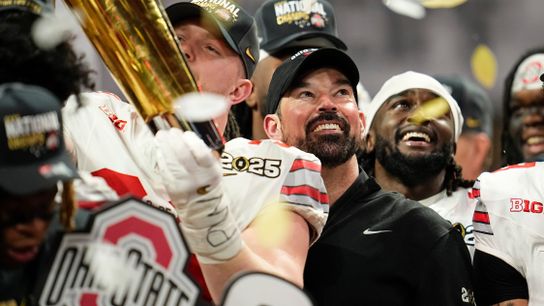Ryan Day's impact calling the Buckeye offense was felt immediately upon his arrival in Columbus two-plus years ago. During that time, he and the offensive staff have been able to put together game plans that have taken some of the nation's best defenses to task - none of those more memorable than their dismantling of rival Michigan last season when they put up 62 points.
According to Eleven Warriors, who profiled some advice on game planning Day gave to coaches in attendance at the annual Ohio State Coaches clinic earlier this month, Day has very interesting and organized approach to structuring the installation and teaching progression of what they do offensively. It starts with something he calls "bucket organization."
“I believe with all my heart in bucket organization. We have certain buckets on offense. They are concepts that our players will learn," Day shared with the coaches in attendance.
Day says that they spend their off season working on variations of their gap and zone scheme stuff, meaning that a responsibility may change for a player or two, but the variations can largely fit in one of a few "buckets". Spring is the time for players to familiarize themselves with those, and by fall they're rolling with the game plan and picking and choosing the variations they feel work best for that particular week.
"It’s a Monday or Tuesday morning and somebody wants to put in a new run play. Bad news. That going to be a long day at the office on Saturday. It’s very, very difficult to put in a new scheme for a high school or college kid in three days. We all know that’s not going to happen. It might look good against one look, but the minute they bring the WILL, or they bring some sort of stunt or change the front we’re in trouble."
That's why they decide to keep things simple and in the bucket system. It's not a new scheme, but rather a minor tweak for a guy or two, or the backfield action looks a bit different.
While Day's call sheet obviously includes calls for situational stuff like third and long and other situations like we all have worked into the plan as coaches on game day, the bucket concept continues in the pass game with categories for short passes / screens / RPOs, mid-range passes, crossing routes, isolations, deep shots down the field, and passes specific to game situations.
Lastly, and perhaps the most interesting nugget in Day's entire talk, is that he believes your quarterback needs to practice a play over 100 times before running it in a game in order to get the end result you want.
Head here to read the full article, including more valuable thoughts from Day.
